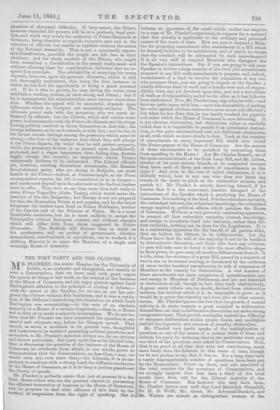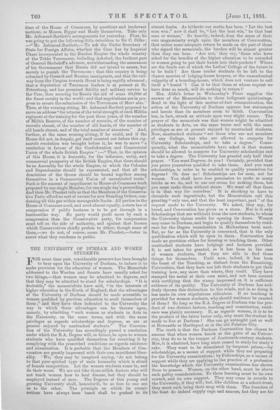THE TORY PARTY AND THE CLOTURE.
MR. PLUNKET, the senior Member for the University of Dublin, is so moderate and thoughtful, and usually so wise a Conservative, that we have read with great regret his speech at Glasgow last week, on the subject of the business of the House of Commons, and his angry protest against Lord Hartington's adhesion to the principle of closing a debate,— with the assent of the Speaker, for no one as yet has pro- posed the Cloture without this limitation, and it was a resolu- tion of Mr. Dillwyn's embodying this limitation on which Lord Hartington was commenting,—by the vote of an absolute majority in a House of a certain magnitude,—that is, a House not so thin as to make a majority meaningless. We do not be- lieve that Mr. Plunket can have considered the question in any careful and adequate way, before his Glasgow speech. That speech, as usual, is moderate in its general tone, thoughtful and humorous in its modes of presenting political questions, and animated, as Mr. Plunket's speeches always are, by an obvious and sincere patriotism. But party spirit has so far blinded him, that in discussing the question of the business of the House of Commons, he overlooks facts which, to our minds, prove to demonstration that for Conservatives, no less than,--nay, we would even say, even more than,—for Liberals, it is as im- portant to condense with a strong hand the diffusive tendencies of the House of Commons, as it is to keep a jealous guard over the liberty of speech.
Mr. Plunket is perfectly aware that just at present it is the Irish Home-rulers who are the greatest sinners in preventing the efficient transaction of business in the House of Commons, and he proposes to deal with offences of this kind by the method of suspension from the right of speaking. But it' ti betrays an ignorance of the world which excites our surprise in a man of Mr. Plunket's experience, to suppose for a moment that this penalty is applicable to the ordinary and principal causes of the waste of time. How are you to suspend a Mem- ber for proposing amendment after amendment to a Bill which he honestly believes to be mischievous, and of which he thinks that the mischief will be attenuated by such amendments ? It is all very well to suspend Members who disregard the the Speaker's instructions. But if you are going to ask your Speaker to declare a large number of the bond fide amendments proposed to any Bill unfit amendments to propose, and, indeed, amendments of a kind to involve the suspension of any one who proposes them, you are going to impose on the Speaker a totally different kind of work and a totally new sort of respon- sibility from any yet devolved upon him, and not a sort either of work or of responsibility suited to the office as it has hitherto been understood. Now, Mr. Plunket may urge what he will,—and here we quite agree with him,—as to the desirability of making the rules against obvious obstruction more severe and effectual ; but when he has done this, he has hardly touched the gigantic evil under which the House of Commons is now labouring. It is not obvious obstruction, but obstruction either so carefully veiled that it is impossible to punish it as intentional obstruc- tion, or else quite unintentional and not deliberate obstruction at all, with which we have chiefly to deal. Look at the number of amendments to every important Bill which now crowd the Notice-papers of the House of Commons. Are the movers of these amendments to be punished by suspending them from speaking in the Holise ? Are Mr. Charles Russell, one of the most earnest friends of the. Irish Land Bill, and Mr. Litton, another of its most earnest friends, to be suspended because they have each of them put scores of amendments on the paper ? And even in the case of veiled obstruction, if it is skilfully veiled, how is any one who does not know the secrets of the heart to pitch on the obstructive animus, and. punish it ? Mr. Plunket is utterly deceiving himself, if he fancies that it is the occasional, insolent disregard of the instructions of the Speaker which is paralysing the House of Commons. It is nothing of the kind. It is the redundant curiosity, the redundant interest, the redundant knowledge, the redundant energy applied to political affairs, which paralyse the House of Commons. Without a very powerful condensing apparatus, to compel all that redundant curiosity, interest, knowledge, and energy to transform itself into intensity, rather than dif- fuse verbosity, nothing can be done for the Legislature. It is as a condensing apparatus for the benefit of all parties alike, that we believe the 018ture to be indispensable. Let the House know that the will of the majority is not to be baulked by interminable discussion, and those who have any criticism to pass will take care to throw it into the most effective shape in their power, to pare away all needless diffusiveness from it. It is idle, when the existence of a great Bill, passed by a majority of two to one on its second reading, is threatened by the existence of some twelve hundred amendments, to talk of suspension of Members as the remedy for Obstruction. A vast number of these amendments are mere symptoms of superabundant care and energy in Members of Parliament, and are not intended. as obstruction at all, though in fact they work obstructively. A great many others are, no doubt, devised from obstructive motives, but motives which it is as impossible to prove as it would be to prove the sincerity and bona fides of other amend- ments. Mr. Plunket ignores the fact that the growth of mental activity is in many respects a great mischief to deliberative Assemblies—at least to deliberative Assemblies not under strong compressive laws. That growth multiplies tenfold the difficulty of adequate deliberation within proper limits, and multiplies tenfold the ingenuity and resource of stealthy obstruction. Mr. Plunket very justly speaks of the multiplication of questions as one of the causes of a serious waste of time, and defends his party by declaring that in one particular week only one-third of the questions were asked by Conservatives. Well, that is no proof at all that they were not contributing much more freely than the Liberals to this waste of time, though we do not profess to say that it was so. For a long time back a vastly disproportionate number of questions have been put by the Home-rulers. Count up these, and add one-third of the total number for the questions of Conservatives, and wo strongly suspect that less than a third of the total would have been left for the Liberal majority of the House of Commons. But however this may have been, Mr. Plunket knows very well that Lord Randolph Churchill, Sir H. D. Wolff, Mr. Goret, Mr. Ashmead-Bartlett, and {Mr. Warton are almost as distinguished wasters of the time of the House of Commons, by questions and irrelevant motions, as Messrs. Biggar and Healy themselves. Take only Mr. Ashmead-Bartlett's arrangements for yesterday. First, ho was going to put the following little catechism to Sir C. Dilke : —"Mr. Ashmead-Bartlett,--- To ask the Under Secretary of State for Foreign Affairs, whether the Czar has by Imperial Ukase incorporated in the Russian Empire the whole country of the Tekke Turcomans, including Askabad, the furthest part of General Skobeleff's advance, notwithstanding the assurances of his Government that Russia did not intend to annex, but merely to punish the Turcomans ; that this country is being colonised by Cossack and Russian immigrants, and that the rail- way from the Caspian towards Herat is being rapidly advanced ; that a deputation of Turcoman leaders is at present at St. Petersburg, and has promised fidelity and military service to the Czar, thus securing for Russia the aid of some 60,000 of the finest cavalry in the world ; and that negotiations are in pro- gress to secure the submission of the Turcomans of Mery also." Then, at the evening sitting, Mr. Ashmead-Bartlett proposed to move an address " for returns of the total strength of each Militia regiment at the training for the past three years, of the number of Militia Reserve, of the number of recruits, of the number of recruits absent, of the number of old hands, of the number of old hands absent, and of the total number of absentees." And, further, at the same evening sitting, if he could, and if the House did not, in despair, get itself counted out before this rig- marole resolution was brought before it, he was to move " a resolution in favour of the Confederation and Commercial Union of the whole British Empire " :—" That, in the opinion of this House, it is desirable, for the influence, unity, and commercial prosperity of the British Empire, that there should be an Assembly for the whole Empire, in which the Colonies and Dependencies should be represented, and that all the dominions of the Queen should be bound together among themselves in a Commercial Union of unrestricted trade." Such is the amount of impediment to House-of-Commons work proposed by one single Member, for one single day's proceedings And then Mr. Plunket tells us that the Members of the Conserva- tive Party afford no sort of excuse for new Standing Orders, con- densing all this gas within manageable limits. All parties in the House of Commons need, and need almost equally, a stern law of compression if public business is to be got through in a businesslike way. No party would profit more by such a compression than the Conservative party, for compression must tell on the side of authority, and against that licence which Conservatives chiefly profess to abhor, though some of them,—we do not, of course, mean Mr. Plunket,—foster in secret what they condemn in public.





























 Previous page
Previous page